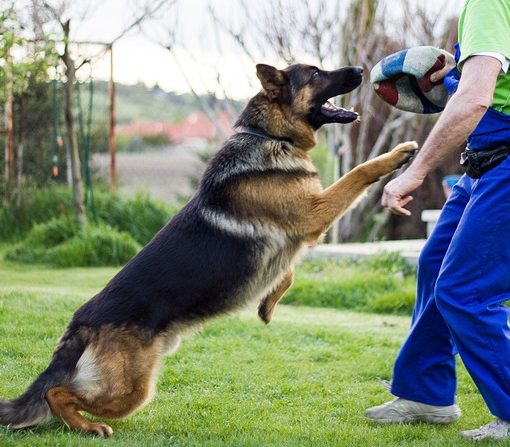German Shepherds are renowned for their exceptional olfactory abilities, which have saved numerous lives.
With a larger olfactory bulb and over 200 million scent receptors, these scent-sensitive dogs are among the best tracking dogs globally. Their excellent sense of smell has helped them locate missing persons, identify explosives, and even identify cancer.
They have utilized their noses for a variety of purposes, such as locating missing persons and detecting drug usage. They are among the best sniffers in the world thanks to their keen sense of smell.
How Does A German Shepherd’s Nose Work?
First, we need to understand how scent works.
Volatile organic compounds (VOCs) are molecules that dogs can smell through their noses. A dog’s nose has a mucus membrane that traps these VOCs and brings them to scent receptors in the olfactory epithelium, a layer of tissue in the nasal cavity. This layer contains millions of scent receptors, giving German Shepherds an incredible sense of smell.
Each receptor is connected to the olfactory bulb in the brain, which analyzes the information and sends signals to the brain, allowing dogs to smell and identify scents with remarkable accuracy. Dogs possess a powerful sense of smell, 10,000 to 100,000 times more powerful than humans, making them useful in search and rescue, drug detection, cancer detection, and law enforcement.
They also have incredible hearing, sight, and touch, allowing them to understand and interact with the world in ways humans cannot. The average dog can hear sounds at frequencies up to 45,000 hertz, making them beloved companions and best friends for both humans and dogs.
14 Factors that Affect a German Shepherd’s Sense of Smell
German Shepherds have a keen sense of smell, capable of detecting objects or scents up to half a mile away, influenced by factors like wind direction, speed, terrain, and scent concentration.
Here’s a list of some of the factors that affect how far a German Shepherd can smell;
- Genetics
- Training
- Health
- Stress
- Wind direction
- Wind speed
- Terrain
- Scent concentration
- Temperature
- Humidity
- Barometric pressure
- Elevation
- Time of day
- Atmospheric conditions
-
Genetics
Some German Shepherds are naturally born with a stronger sense of smell than others.
-
Training
Proper training can help a German Shepherd develop and hone its sense of smell.
-
Health
A German Shepherd’s sense of smell can be affected by health issues such as allergies, infections, or dental problems.
-
Age
As a dog ages, its sense of smell may decline.
-
Stress
Stress can also negatively impact a German Shepherd’s sense of smell.
-
Wind direction
The direction of the wind greatly affects a dog’s scent. When the wind is blowing in the dog’s direction, it may sniff the scent farther away; when it is blowing in the other direction, the dog must be closer. Because the scent is delivered by light, small molecules that are transported by the wind, the German Shepherd can detect it at a wider distance.
-
Wind speed
Wind speed significantly affects a dog’s scent, as faster winds carry scent molecules further, allowing them to reach the dog’s nose more quickly, while slower speeds take longer, indicating its effectiveness.
-
Terrain
The German Shepherd’s scent sensitivity is significantly influenced by terrain, with open fields allowing easy movement of scent molecules, while forests or tall buildings in cities block scent molecules, reducing their strength.
-
Scent concentration
The German Shepherd’s olfactory abilities are influenced by factors like scent concentration, temperature, humidity, and skin color, with more molecules allowing for further detection from a distance.
-
Temperature
A German Shepherd’s sense of smell is greatly influenced by temperature; on bright days, warmer air allows the dog to smell farther, while cooler air slows movement and necessitates closer proximity to the scent source.
-
Humidity
High humidity levels can hinder a German Shepherd’s ability to smell scent molecules due to increased moisture absorption, while low humidity levels allow scent molecules to move freely, enabling the dog to smell them from a distance.
-
Barometric pressure
The German Shepherd’s sense of smell is influenced by barometric pressure, which affects the movement of scent molecules, with high pressure slowing them down and low pressure accelerating them and also affecting their height.
-
Elevation
The German Shepherd’s olfactory abilities are influenced by its elevation, with higher elevations allowing the dog to smell scent molecules from a distance, and lower elevations requiring closer proximity.
Next Post: Can A Pitbull Kill A German Shepherd?
Tips on How to Help your German Shepherd Develop their Sense of Smell
Methods to help dogs develop their sense of smell and discusses the training methods used to train these super sniffers.
Here are a few more tips to help your German Shepherd develop their sense of smell;
- Provide your dog with a variety of scents to explore.
- Keep their nose busy with scent-related enrichment activities
- Play scent games with your dog
- Give your German shepherd opportunities
- Study your dog’s body signs
- Impulse control
- Never stop training
Provide your dog with a variety of scents to explore
To teach your dog to recognize scents, take them to parks, forests, and fields, expose them to various smells like animals, food, and plants, engage in scent work, hide treats or toys, and take them on scent walks.
Keep their nose busy with scent-related enrichment activities
To keep your dog’s nose active, use puzzle toys or scent-related enrichment activities. The trainer will teach scent tracking, placing an object with a specific scent in a specific area and encouraging the dog to find it over time.
Play scent games with your dog
Playing scent games with your dog, like hide and seek or shell game, these games can teach them scent tracking skills, which can be used in tasks like search and rescue or police work.
Give your dog plenty of opportunities to explore their surroundings on walks
Dogs enjoy sniffing new things and making walks enjoyable. Walks are vital for dogs’ mental health, reducing stress and boredom. However, it’s crucial to use the right harness and leash for your dog, as they enjoy scents.
Pay attention to your dog’s body language and encourage them to follow their nose
Following their nose can make them feel relaxed and satisfied. Understanding a dog’s body language is crucial for maintaining a positive relationship. Experts suggest letting your dog lead on walks to build confidence. Pay attention to their body language and be prepared to change direction if they seem stressed or uncomfortable.
Keep training
Training is essential for building trust and bonding with your dog, with positive reinforcement like treats, praise, or play is the most effective method. Consistency and patience are crucial for establishing a strong foundation, and it’s essential to share experiences with different training methods.
Impulse control
To help your German Shepherd develop their sense of smell, practice impulse control by teaching them to wait before investigating a scent. This will help them develop patience and self-control, making scent work more enjoyable for both of you. Start by asking your dog to sit and wait for a few seconds before giving them the cue to investigate a scent.
Fun Facts About German Shepherd Noses
German Shepherds possess a unique organ called Jacobson’s organ in their mouth, enabling them to smell better in the dark and analyze scents more thoroughly. With large nasal cavities and a high number of scent receptors, they can smell up to three miles away and remember scents for up to four years. This ability allows them to track down missing people or animals, making them popular search and rescue dogs.
Frequently Asked Questions About How far A German Shepherd can smell
Does the Age of a German Shepherd affect how far they can smell?
Yes, it does. Puppy dogs may not have fully developed their sense of smell, but with time and training, their ability to smell as far as adult dogs will become stronger.
Do all German Shepherds have the same Ability to Smell?
German Shepherds may have varying odour abilities due to individual differences, training, and health, which can impact their overall sense of smell.
What Environmental Factors Can Affect a German Shepherd’s Sense of smell?
Environmental factors like weather and smells can affect a German Shepherd’s sense of smell. Cold weather reduces scent activity, hot weather accelerates evaporation, strong winds disperse scent molecules, and other smells can mask the scent the dog is trying to detect.
Can A German Shepherd’s sense of smell be affected by health issues?
German Shepherds’ sense of smell can be affected by health issues like allergies, sinusitis, upper respiratory infections, stroke, and head injuries. These conditions cause inflammation in the nasal passages, hinder smell ability, and impact brain function, necessitating immediate health care.
Are German Shepherds better at Smelling than other Dogs?
German Shepherds, bloodhounds, basset hounds, beagles, and Labrador retrievers all possess scenting abilities, but each dog is unique and may be better at smelling within the same breed. The key to a dog’s scenting abilities lies in individual abilities and training.
Can German Shepherds smell underground?
German Shepherds are highly skilled in detecting underground pests like termites and bed bugs through their sense of smell, which can move through cracks, holes, and soil. Some dogs have been trained to identify underground issues like water or gas lines.
Conclusion
German Shepherds have a unique sense of smell that surpasses humans, influenced by environment, health, and training. They can detect a range of scents humans cannot, making them excellent working dogs and beloved companions.
Teaching your dog to pay attention to their name and respond when called involves saying their name, giving them treats, and adding cues.



